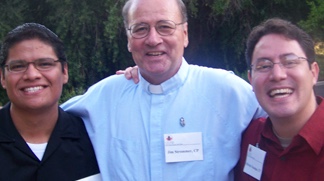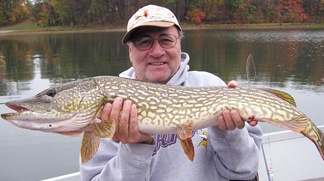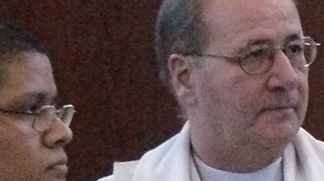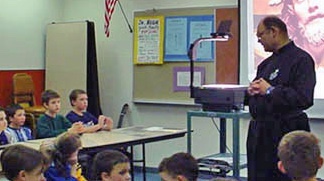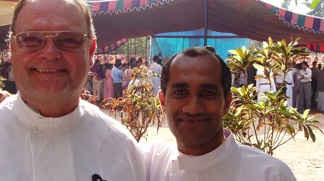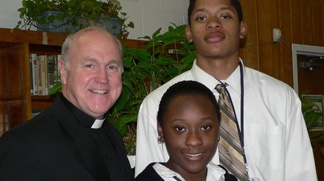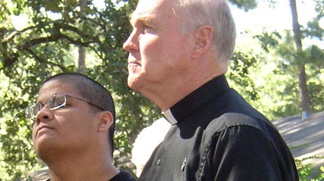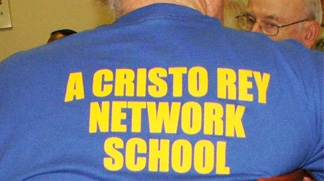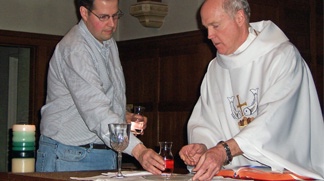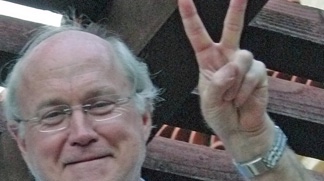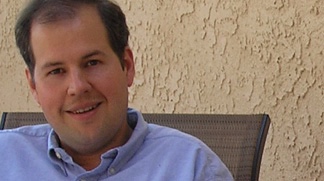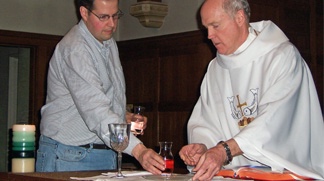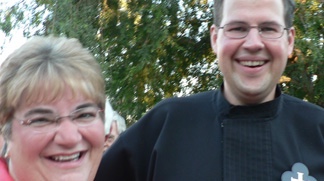Fr. Joseph Moons, CP, reflects on Passionist formation…
Vocations Articles
Signs of Our Call
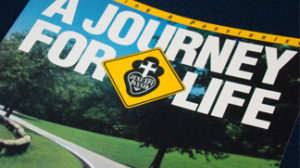 There are times when we need signs to help us find our way.
There are times when we need signs to help us find our way.
Most of the time, such signs are clear and we get where we’re trying to go. At other times, the signs may be there but we don’t know how to read them; we just don’t know where we are and we feel lost. We need a map, some additional help, to get us back on the path towards our destination.
What are some signs that you may have a vocation to religious life or priesthood? How do you know that you may be called to be a Passionist? Here are some signs, or questions, that may provide some direction. The questions need to be answered truthfully, respectfully and from a place of your own inner depth. Superficial answers may mislead you; honest answers will help to bring clarity and direction.
Wandering Questions
- Is there restlessness or longing for a more meaningful life within me?
- Am I sensing something inside of me that makes me feel that I am still lacking something?
- Am I feeling that the person I am today is not being faithful to my “true” self?
- Is my physical or spiritual self telling me something that I am not paying attention to? When have I felt most alive and present?
- How do I feel when I see others suffering?
- What does Jesus’ suffering do to me?
- Do I wonder if the earth and our universe suffer?
- Do I feel that God is somehow mixed up in all of this?
Follow Our Sign…
These signs may be clues to a direction for your future. They can make the difference between a peaceful way of life and a restless one. They can assist you in finding your life’s direction. If you would like to begin to explore whether you might have a religious calling by talking to a Passionist, (U.S. and Canada residents) please contact:
Fr. Chris Gibson, CP
St. Vincent Strambi Passionist Community
5417 S. Cornell Avenue
Chicago, IL 60615
773-324-2704
[email protected]
or
Fr. Jim Strommer, CP
Christ the King Passionist Community
6520 Van Maren Lane
Citrus Heights, CA 95621
916-723-5162
[email protected]
To make a donation to support Passionist Vocations, click here and select Vocations from the drop-down menu.
Come and See Program
Immaculate Conception Community in Chicago hosted four young men who participated in the “Come and See” program while on their journey to discover their specific vocation in life. All four are in vocational discernment; three of whom are in the Come and See program and joined the Thanksgiving celebration hosted by the St. Vincent Strambi Passionist Community in Chicago’s Hyde Park Neighborhood.
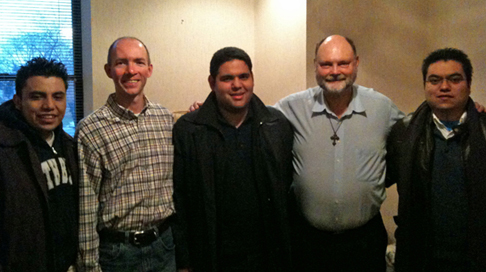
To make a donation to support Passionist Vocations, click here and select Vocations from the drop-down menu.
Interviews with Passionist Priests and Brothers
Learn more from the Passionists about how they heard their call and what their lives are like today.
Fr. James Strommer
[email protected]
Telephone 773.631.6336
“My Passionist way of life has given me a sense of meaning. There are stages along the way: theological, spiritual, and personal development; coming to understand myself in relationship with the Passion, death and resurrection of Jesus. So, it becomes a way of reflecting on events in my life, on my own growth, my spirituality, my relationship with God, my relationship with Jesus, the priesthood, and my ministry.”
Questions and Reflections
How has your experience of prayer changed over the course of the years?
My experience of prayer over the years has become much more personal, to the extent that I have some sense of meaning in relationship to Jesus crucified. So, it’s a backdrop for my own contemplation. Prayer provides the touch points for reflecting on events that happen during the day and it’s also kind of a quiet way to be with God in terms of the Passion of Christ and the suffering of people.
The fourth vow that we take, our vow to keep the Memory of the Passion alive, sets us apart from other religious orders. What is your understanding of that fourth vow?
Well, in our early days, in early formation, there were certain things that we had to do to get a sense that we had fulfilled this fourth vow. If you weren’t a preacher, for example, you’d say certain prayers each day as a kind of a ritual keeping of the vow. Memory is something that happens. It’s something that happens spontaneously. Something ticks off a memory of something else, it becomes a memory of my own relationship with Christ in his Passion— it could be a memory of the suffering of somebody else, which becomes internalized—it’s much more of the heart. Just as memory is a kind of function of the Spirit, so it is with the fourth vow for me.
When you look at your own life, how do you think your life has been shaped by the Passion?
My Passionist way of life has given me a sense of meaning. There are stages along the way: theological, spiritual, and personal development; coming to understand myself in relationship with the Passion, death and resurrection of Jesus. So, it becomes a way of reflecting on events in my life, on my own growth, my spirituality, my relationship with God, my relationship with Jesus, and the priesthood, my ministry.
Fr. Chris Gibson, CP
[email protected]
Telephone: 773.266.1942
“When I was almost 15, I remember once noticing that many of my companions at school just didn’t look happy. Immediately inside of me a question arose: ‘Why not become a priest and help young people find happiness?’ This question, however, came as an interference – I had other plans for myself including a career, marriage and children. So I told myself: ‘Why you? Let others do that.’ But then I thought, ‘if all were to react in this way there would be no priests.’ So I opened my heart, accepted and immediately I was filled with an immense joy.”
Questions and Reflections
You describe a kind of euphoria in surrendering to your vocation. But then that passed?
Yes. But even when the initial euphoria had gone, I knew deep down that if I didn’t follow the journey I would be denying my very self. It was as if I had a new inner identity.”
Are the challenges in discerning a vocation different today than they were for you?
I think many of the challenges are similar. It’s hard for young people to give up the idea of getting married or pursuing a profession. For those who feel a call, the activity of life can be distracting, leading them to set aside the initial call until it may pop up again years later.
One of the big challenges to any vocation is the life commitment, along with the fear, “what if I make a mistake?” Often we think of a call as taking something away from us. But a call doesn’t eliminate your personality and unique qualities. In fact, they will color what you contribute to the community and your ministry.
In the case of celibacy, for example, it doesn’t mean that your paternal instincts don’t exist or are taken away. It just means they are expressed differently. I have not fathered a child in the traditional sense, of course, and yet if someone were to ask me if I had children, I would say yes, I have thousands! Celibacy doesn’t take away your humanity, it enhances it.
What has sustained you over the years?
My meditation on the Passion of Christ, especially God’s love for me personally, not just in general, as He loves all of us. That has been my greatest strength and has motivated me to try to bring that same awareness to others.
For me, the Passion of Jesus Christ is truly the most powerful instrument of God to conquer our hearts. On the one hand, it is the maximum expression of sin; there can be no greater sin than human beings condemning their own God to death. If that doesn’t shock us into seeing the evil power of sin, then what would? But the Passion is also the maximum expression of God’s love. So if that doesn’t fill up our hearts, what will? The Cross is God’s way of helping us renounce sin and allow ourselves to be captivated by His love and a desire to love and serve Him and others as He did for us.
Personally, the Passion also helps me to put my own suffering in its proper perspective. In the plan of redemption, our suffering is never wasted when we assume it; we actually share in our own Redemption (see Col. 1:23). Of course it’s not that we must look for suffering. One inevitably encounters it in life and the Passion helps us to deal with it in a positive and meaningful way. It’s the transmission of this message that I think is the best way to bring happiness to young people and others. When they realize how much God forgives and loves them, there can be no greater source of happiness.
Fr. Alex Steinmiller
President
Holy Family Cristo Rey High School
Birmingham, Alabama
“The Passion of Christ has challenged me through the years, first of all, to grow up. And this has come through community life. I believe that being a religious and living in community does not exempt me from the realities of what it is to grow up as a man. And I believe, very personally, that the Passion of Christ in my own life has carried me through times of immaturity to a greater maturity.”
Questions and Reflections
As you entered into the Passionist Community, what are some of the things that have been formative for you within the Passionists?
Well, I think one of the formative things is learning that I can’t live passionately if I don’t have a passionate inner life. I found the ways — the creative ways — that we pray and we meditate and contemplate are very attractive to me. That became a real source of creativity for me, so, I’d say our prayer life is very creative. Secondly, missionaries, especially missionaries who have been willing to go beyond the domestic states to other countries, have been a real witness to me even though I have not done that. I find their witnesses incredible.
Identification of the Passionist charism has evolved over the years, from the idea of having devotion to the Passion, to dedication to keeping the memory of the Passion alive in the world and in our hearts.
What influence has this had on you?
I’ve always found a deeply personal commitment to our charism as devotion, to enter into all that is involved in that mystery: the activity of Christ—so public—doing good works and doing works of justice, the threats of death to him, the unfortunate rejections he received, the resistance. I have been devoted to that. So, when the phrase “Memory of the Passion” became more of a contemporary term, I found myself pretty much turned on by memory in the sense that the memories I had of Christ working in my life are memories of his Passion. And his Passion has enabled me not only to work with zeal, but also, I believe, I have been protected by the Cross of Christ. It’s a whole new way of looking at Christ’s passion and death as a protection that we carry with us. I believe, through the years, especially working with at risk young adults in areas which we consider dangerous, I have felt protected by the Cross of Christ and his Passion.
If a young man told you today that he was considering the Passionist Community, what would you say to him?
If a young man approached me about being a Passionist, I would say to him… “Get ready for a real adventure of the heart. Get ready for a real commitment to touching the hearts of people.” I think Passionists touch the hearts of people in a very unique way, and that is through the insights that can come in people’s sufferings. I said insights rather than obstacles because I think often times suffering is seen as a tremendous obstacle and actually an end to life. In reality, because of the Passionist charism, because of the gift that we have for the Church, we see that sufferings are actually an entree into new life. I think that’s the adventure that I would invite young men to. The adventure of being a Passionist, living passionately the will of Christ, especially, for the most abandoned.
Br. Kurt Wernert
Retreat Director
Christ the King Retreat Center
“I feel that Christ is brother to all people. He is my ultimate model in terms of being a brother to others—for my ministry, my life in community, and the people that I pray for. I’ve seen how Jesus, in his personhood, as a man, was very much a brother to people who had no one. He was very present to people who were isolated or on the fringes of society. He reached out to them and taught in many different contexts.”
Questions and Reflections
Your first focus in the seminary was to study for priesthood. How did you discern that you were being called to be a brother?
My experience in a diocesan seminary program gave me a good education. It also gave me a valuable opportunity to participate in summer internships and other activities that helped me realize that too many aspects of priestly ordination do not resonate with who I am called to be. Having gone to the Xaverian Brothers High School, I had early role models of living the life of a brother. I saw myself in terms of being a brother within a religious community and serving in some type of ministry. The kinds of ministry that drew me were not activities requiring ordination.
The more I got to know Passionist brothers, the better I knew there was something right about this vocation, it seemed “correct.” A lot of the brothers I was interacting with were more of the “old style brothers,” the working brothers. I was very much drawn to their devotion, their dedication to the community. That is what brought me into the community more deeply. There is a different level of professionalism to brotherhood these days. In the past, most brothers were skilled tradesmen. Today, brothers are called into preaching and counseling, as well as administration. These are skills that I’m learning, and adapting to do well in this environment.
One of the gifts of the brotherhood today is that there’s a little more freedom. I won’t be held to certain liturgical or priestly responsibilities, and might have options to move into different ministerial environments, that as a priest, I might not be able to do. With either vocation, there are gifts and sacrifices. I just continue to be open to exploring the gifts and possibilities of religious brotherhood.
It’s important not to get caught up in comparisons of brotherhood and priesthood. Some people misunderstand the vocation of brothers, thinking brothers are the guys who couldn’t cut it as priests. Brotherhood is not “priesthood-lite”—made up of guys who couldn’t cut it in an academic and ministerial environment. I am trying to dispel some of that ignorance. I have not been called to ordained ministry, but to a different style of vowed service within the Passionist community.
As a Passionist Community, we preach Christ Crucified. How do you do you encounter the Passion in your ministry?
If we look at the crucifix in our chapel, we see Jesus is still on the cross and his eyes are open—he is still suffering. For me, Christ crucified is still alive and is still suffering in people today, people who are poor or oppressed, people who deal with addictions. And a lot of those people come here, a lot of those people I’ve met on retreat weekends. They are very much suffering, experiencing the Passion in their lives.
Sometimes people feel they are suffering for something they’ve done. They’ve made poor choices and they’ve made some mistakes in life. There might be an element of truth in that, but when I’m companioning with people, I invite them to see their suffering in a different way, that Jesus is walking with them in their suffering, and that it can be the stuff that can become new life, that can be moved in a different direction.
Sometimes it’s hard just to be with people who are suffering. It’s hard but it’s good too, there is a certain giftedness that I feel, it’s almost a privilege, when people open up and start sharing the woundedness and the pain in their life. I am amazed by the faith of some people, just in light of what they’ve endured, and how they’ve experienced Good Friday and yet they have also experienced the Resurrection. Other times, people just see suffering as carrying the cross uphill. It’s difficult and it’s painful, and life is a mess. That’s when offering a word of hope, or just being there—sitting in the mud with them, so to speak, listening to what they are going through, can be the catalyst for new life, for new energy to come forth. When a person feels that “Someone’s heard me now,” they become able to let go of the pain. Inviting people to let go of their pain, to let Jesus help them along, is a tremendous gift in the ministry of being present. I continue to be amazed at how Christ works in the lives of people.

